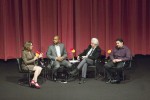The Hammer Museum hosted a forum to discuss the results of the presidential election Tuesday night.
Two political scientists and a public policy scholar examined the effectiveness of political ad campaigns, roles of black voters and the link between racial and economic anxiety at the event titled “Election Postmortem.”
Lynn Vavreck, UCLA professor of political science and communication studies, pointed out three numbers she thought highlighted the closeness of the election: 77,000, the total votes needed in Wisconsin, Michigan and Pennsylvania to swing the election in favor of Hillary Clinton; 2,800,000, the total votes by which Donald Trump lost the popular vote; 58, President Barack Obama’s approval rating.
“This election was just very close and it’s impossible to pinpoint any single thing that resulted in the outcome,” Vavreck added.
Vavreck said when investigating the advertising messages, she found both candidates’ ads largely focused on personality traits. About 76 percent of Clinton’s ads focused on traits and identity, specifically Trump’s personality traits. About 46 percent of Trump’s ads also targeted traits, but 34 percent of his ads were about the economy and jobs, compared to Clinton’s 9 percent.
Vavreck explained how these ads targeted various audiences and identities.
Despite the efforts of candidates to target and draw in certain audiences, the results of the recent election shocked many. Theodore Johnson, a public policy scholar, discussed how the recent election demographics in regards to black voters surprised people.
Johnson said Donald Trump received 8 percent of the black vote in 2016, which means he did better with black voters than John McCain and Mitt Romney. He said the complexity of black voters is often overlooked.
“We don’t really appreciate the diversity of the black community when we talk about presidential elections, even in one that has broken all of the norms that we have come to expect of black voters in presidential elections,” Johnson said.
Michael Tesler, an assistant professor of political science at University of California, Irvine, discussed the racial and ethnic anxiety in white support for Trump.
Tesler said Trump’s main message was that undeserving, undocumented immigrants are getting way more than they deserve in society. He added racial resentment is just the economic anxiety.
Rebecca Wolff, a UCLA graduate student in art history said she thought the speakers generally presented the information in an interesting manner, but there were noticeable biases in some of their presentations.
“All of (the speakers) have a bias, but that is not necessarily a bad thing,” Wolff added.
Sylvia Abdullah said she thought it was interesting how Tesler was able to quantify racial bias, but not gender bias.
—
Read more Daily Bruin coverage of the presidential inauguration, along with analysis of California and federal policy under the Trump Administration:

